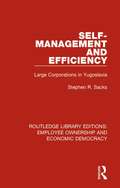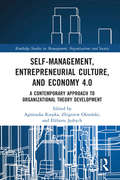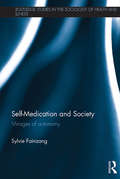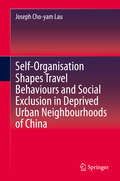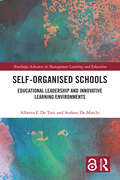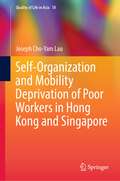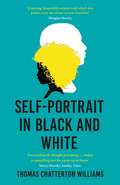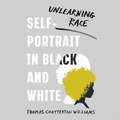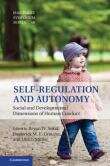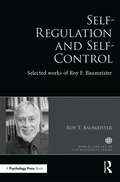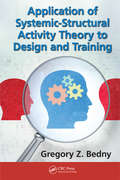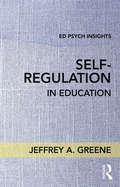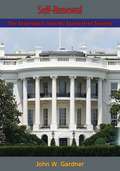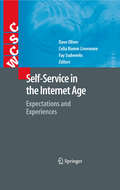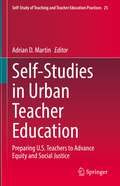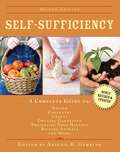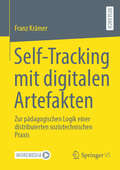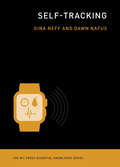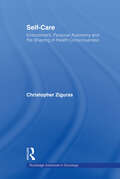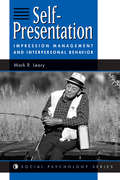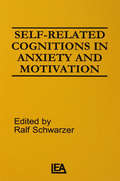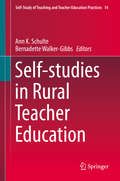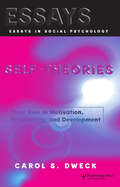- Table View
- List View
Self-Management and Efficiency: Large Corporations in Yugoslavia (Routledge Library Editions: Employee Ownership and Economic Democracy #12)
by Stephen R. SacksThe book, first published in 1983, examined whether the Yugoslavs’ extensive implementation of their principle of self-management by small work units was costly in terms of economic efficiency. Were they atomizing their firms into inefficiently small fragments? Was the system of worker self-management appropriate only for small firms? Can a modern industrial enterprise of efficient scale, indeed very large scale, by run that way? In order to answer these questions, the author applies to large firms in former Yugoslavia the transactions cost analysis developed by the economist Oliver Williamson.
Self-Management, Entrepreneurial Culture, and Economy 4.0: A Contemporary Approach to Organizational Theory Development (Routledge Studies in Management, Organizations and Society)
by Agnieszka RzepkaThis book offers practical insight into the changing ways in which organizations operate today. Building on a groundbreaking concept of teal organizations, the book illustrates the practicality of advocating a lack of hierarchy of predetermined positions and the introduction of roles that come with clear responsibilities constantly defined according to current needs. First described by Frederic Laloux, a teal organization is a ground-breaking approach to managing organizations that is being adopted around the world, which turns everyone into a leader. This new paradigm rests on the ideas of wholeness, evolutionary purpose, employee autonomy, and self-management based on peer relationships. Its main assumption is the empowerment of the employee resulting in a change in workplace relationships and a more soulful and purposeful work environment. Drawing on the authors’ research across six different countries, it presents the evolution of self-management and entrepreneurial culture in the current age of Economy 4.0 and examines how the teal concept has been implemented around the world. It examines misconceptions surrounding this novel approach and diagnoses the practical problems connected with implementing it in the current uncertain times. It will be of value to researchers, academics, managers, and students in the fields of management and organizational studies.
Self-Management, Entrepreneurial Culture, and Economy 4.0: A Contemporary Approach to Organizational Theory Development (Routledge Studies in Management, Organizations and Society)
by Agnieszka RzepkaThis book offers practical insight into the changing ways in which organizations operate today. Building on a groundbreaking concept of teal organizations, the book illustrates the practicality of advocating a lack of hierarchy of predetermined positions and the introduction of roles that come with clear responsibilities constantly defined according to current needs. First described by Frederic Laloux, a teal organization is a ground-breaking approach to managing organizations that is being adopted around the world, which turns everyone into a leader. This new paradigm rests on the ideas of wholeness, evolutionary purpose, employee autonomy, and self-management based on peer relationships. Its main assumption is the empowerment of the employee resulting in a change in workplace relationships and a more soulful and purposeful work environment.Drawing on the authors’ research across six different countries, it presents the evolution of self-management and entrepreneurial culture in the current age of Economy 4.0 and examines how the teal concept has been implemented around the world. It examines misconceptions surrounding this novel approach and diagnoses the practical problems connected with implementing it in the current uncertain times. It will be of value to researchers, academics, managers, and students in the fields of management and organizational studies.
Self-Medication and Society: Mirages of Autonomy
by Sylvie FainzangThe question of recourse to self-medication arises at the intersection of two partly antagonistic discourses: that of the public authorities, who advocate the practice primarily for economic reasons, and that of health professionals, who condemn it for fear that it may pose a danger to health and dispossess the profession of expertise. This books examines the reality of self-medication in context and investigates the social treatment of the notion of autonomy ever present in the discourses promoting this practice. Drawing on fieldwork conducted in France, the author examines the material, cognitive, symbolic and social dimensions of the recourse to self-medication, considering the motivations and practices of the subjects and what these reveal about their relationship with the medical institution, while addressing the question of open access to medicines – a subject of heated debate between the actors concerned on themes such as competence, knowledge and responsibility. A rigorous analysis of the strategies adopted by individuals to manage the risks of medicines and increase their efficacy, Self-Medication and Society will appeal to sociologists and anthropologists with interests in health, illness, the body and medicine.
Self-Organisation Shapes Travel Behaviours and Social Exclusion in Deprived Urban Neighbourhoods of China
by Joseph Cho-yam LauThis book investigates the influence of self-organisation processes on the commuting of the poor workers in urban China. It suggests a new approach to investigate and measure individual access, and it argues that dynamic interactions between individual action and social structure influence individual’s access to transport, which cannot be measured using other traditional accessibility approaches.The overwhelming majority of models in transport research assume that socio-economic factors and the built-environment influence the accessibility of transport for individuals. This book provides evidence that individual decision-makings and actions are also vital factors to bring out changes in accessibility. Further, the study adopts a self-organisation process and structuration theory to illustrate that a significant proportion of travel problems of migrants are rooted in the interaction between actions and social structures. Any change in migrants’ actions or social structures in the self-organisation process would result in the production of complex and spontaneous travel behaviour. The self-organisation approach presented provides a new approach for urban transport planning in the future, particularly on the investigation of the accessibility of disadvantaged social groups. By using the social theories, transport research can have an effect on commuting behaviour and to improve poor workers’ quality of life.
Self-Organised Schools: Educational Leadership and Innovative Learning Environments (Routledge Advances in Management Learning and Education)
by Alberto F. De Toni Stefano De MarchiSelf-Organised Schools: Educational Leadership and Innovative Learning Environments describes the results of the research we carried out at fourteen Italian schools that highlight how there is a positive correlation between the capabilities of school self-organization and the innovativeness of learning environments: in other words, the more self-organized schools are, the more innovative learning environments are. The results of this work are part of the strand of research of bottom-up emergency and self-organization, an extremely fruitful trend as shown by Sugata Mitra, the founder of the Self-Organized Learning Environments, according to whom, "education is a self-organized system where learning is an emerging phenomenon". This book gives new insights on self-organization studies, and most of all, to the idea that change - organizational and educational innovation - sparks from the bottom. This book is aimed specifically at school principals of all levels, scholastic reformers, educational scholars, organisation and management consultants who want to innovate learning and management of learning. These actors will benefit drawing useful examples from more than thirty different learning environments worldwide, fourteen examples of schools that self-organize, two frameworks - and two ready-to-use questionnaires - measuring the innovativeness of a learning environment, and the capability of a school to self-organize. Self-organization is the most fascinating future of innovative principals
Self-Organization and Mobility Deprivation of Poor Workers in Hong Kong and Singapore (Quality of Life in Asia #18)
by Joseph Cho-Yam LauThis book focuses on the influence of socio-economic and land-use policies on the commuting problems and quality of life of the poor in Singapore and Hong Kong. It considers the influence of self-organisation: how the mobility of an individual is constituted by structures such as transport systems or socio-economic structural factors, as well as influenced by individual decisions. Where most transport studies focus on the influence of factors such as income inequality, the gender gap, and the built environment, this book fills a gap in paying particular attention to the influence of individual decisions on commuting. Given the prevalence of the former in research, government decision-makers are often constrained by these approaches and fail to understand the commuting problems of the poor. This book argues that the self-organisation approach provides some ideas that are outside the common conceptual framework in conventional transport planning and looks to improve mobility of lower-income commuters. Relevant to social science researchers working in areas such as urban planning and transport, mobility deprivation, and poverty, this book breaks new ground in quality of life studies in the Singapore and Hong Kong contexts.
Self-Portrait in Black and White: Unlearning Race
by Thomas Chatterton WilliamsA SUNDAY TIMES BOOK OF THE YEAR A TIME 'MUST-READ' 'An extraordinarily thought-provoking memoir that makes a controversial contribution to the fraught debate on race and racism . . . intellectually stimulating and compelling' SUNDAY TIMESA reckoning with the way we choose to see and define ourselves, Self-Portrait in Black and White is the searching story of one American family's multi-generational transformation from what is called black to what is assumed to be white. Thomas Chatterton Williams, the son of a 'black' father from the segregated South and a 'white' mother from the West, spent his whole life believing the dictum that a single drop of 'black blood' makes a person black. This was so fundamental to his self-conception that he'd never rigorously reflected on its foundations - but the shock of his experience as the black father of two extremely white-looking children led him to question these long-held convictions.It is not that he has come to believe that he is no longer black or that his daughter is white, Williams notes. It is that these categories cannot adequately capture either of them - or anyone else, for that matter. Beautifully written and bound to upset received opinions on race, Self-Portrait in Black and White is an urgent work for our time.
Self-Portrait in Black and White: Unlearning Race
by Thomas Chatterton WilliamsA reckoning with the way we choose to see and define ourselves, Self-Portrait in Black and White is the searching story of one American family's multi-generational transformation from what is called black to what is assumed to be white. Thomas Chatterton Williams, the son of a 'black' father from the segregated South and a 'white' mother from the West, spent his whole life believing the dictum that a single drop of 'black blood' makes a person black. This was so fundamental to his self-conception that he'd never rigorously reflected on its foundations - but the shock of his experience as the black father of two extremely white-looking children led him to question these long-held convictions.It is not that he has come to believe that he is no longer black or that his daughter is white, Williams notes. It is that these categories cannot adequately capture either of them - or anyone else, for that matter. Beautifully written and bound to upset received opinions on race, Self-Portrait in Black and White is an urgent work for our time.(P) 2019 Tantor Media Inc
Self-Regulation and Autonomy
by Ulrich Müller Bryan W. Sokol Frederick M. E. Grouzet Bryan W. Sokol Frederick M. E. GrouzetSelf-regulation and autonomy have emerged as key predictors of health and well-being in several areas of psychology. This timely volume brings together eminent scholars at the forefront of this research, which is taking place in disciplines including developmental psychology, developmental neuroscience, social psychology and educational psychology. The contributors present ideas and research findings on the development of self-regulation and autonomy, including their biological bases, antecedents and consequences. Editors Bryan W. Sokol, Frederick M. E. Grouzet and Ulrich Müller have shaped the volume's multidisciplinary perspective on self-regulation and autonomy to reflect the legacy of Jean Piaget, the trailblazing developmental psychologist whose work drew on a diverse body of research.
Self-Regulation and Self-Control: Selected works of Roy F. Baumeister (World Library of Psychologists)
by Roy BaumeisterIn the World Library of Psychologists series, international experts present career-long collections of what they judge to be their finest pieces—extracts from books, key articles, salient research findings, and their major practical theoretical contributions. In this volume, Roy F. Baumeister reflects on his distinguished career as an eminent scholar in the field of self-control and self-regulation, as well as belonging, rejection, free will, and consciousness. Offering a unique perspective on both the program of research in ego-depletion as one of social psychology’s most widely successful theories, and its position in the changing landscape of the scientific field, the book charts Baumeister’s development as one of the pioneers of study into self-control. Featuring a newly written introductory piece in which the author offers a unique insight into the initial findings that led to an eventual theory of ego-depletion, this collection will give readers a vital understanding of how the hugely influential theory of ego depletion first came to be developed, and is essential reading for students and researchers in self-control and self-regulation.
Self-Regulation in Activity Theory: Applied Work Design for Human-Computer and Human-Machine Systems (Ergonomics Design & Mgmt. Theory & Applications)
by Waldemar Karwowski Gregory Z. Bedny Inna BednyEvery complex human-machine system includes a computer as a critically important means of work. However, an operator's interaction with a computerized system cannot be reduced to only performing computer-based tasks. Today human-computer interaction (HCI) is not limited to trained software users. People of all ages use all different kinds of gadget
Self-Regulation in Education (Ed Psych Insights)
by Jeffrey A. GreeneSelf-regulation in education is a familiar and important topic for all educators: professors, administrators, teachers, researchers, journalists, and scholars. As educational standards require that students take control of what and how they learn, self-regulation skills are essential to student success. Written by a leading expert on self-regulation and self-regulated learning, this book situates the topic within the broader context of educational psychology research and theory, bringing it to a wider audience. With chapters on the fundamentals of self-regulation, explanations of its uses, and advice for best application, this concise volume is designed for any education course that includes self-regulation in the curriculum. It will be indispensable for education researchers and both pre- and in-service teachers alike. Jeffrey A. Greene is Associate Professor in the Learning Sciences and Psychological Studies program in the School of Education at the University of North Carolina at Chapel Hill, USA.
Self-Renewal: The Individual and the Innovative Society [First Edition]
by John W. Gardner“The only stability possible is stability in motion.”—John William GardnerIn his classic treatise Self-Renewal, John W. Gardner examines why great societies thrive and die. He argues that it is dynamism, not decay, that is dramatically altering the landscape of American society. The twentieth century has brought about change more rapidly than any previous era, and with that came advancements, challenges, and often destruction. Gardner cautions that “a society must court the kinds of change that will enrich and strengthen it, rather than the kind of change that will fragment and destroy it.”A society’s ability to renew itself hinges upon its individuals. Gardner reasons that it is the waning of the heart and spirit—not a lack of material might—that threatens American society. Young countries, businesses, and humans have several key commonalities: they are flexible, eager, open, curious, unafraid, and willing to take risks. These conditions lead to success. However, as time passes, so too comes complacency, apathy, and rigidity, causing motivation to plummet. It is at this junction that great civilizations fall, businesses go bankrupt, and life stagnates. Gardner asserts that the individual’s role in social renewal requires each person to face and look beyond imminent threats.Ultimately, we need a vision that there is something worth saving. Through this vision, Gardner argues, society will begin to renew itself, not permanently, but past its average lifespan, and it will at once become enriched and rejuvenated.
Self-Service in the Internet Age
by David Oliver Celia Romm Livermore Fay SudweeksThe Internet has emerged as a network which enables a vast range of interactions between businesses and government organizations and individuals. These interactions are classified as B2C (business to consumer), B2B (business to business) and C2C (consumer to consumer) creating ever growing forms of Internet connectedness. This connectedness enables a vast range of self-service opportunities via the Internet. Self-Service in the Internet Age explores attitudes and behaviors to this new form of self-service provision. It focuses on how services are used and viewed by those who choose to use or not use them in a variety of contexts such as personal banking, shopping, travel, education, and health.
Self-Studies in Urban Teacher Education: Preparing U.S. Teachers to Advance Equity and Social Justice (Self-Study of Teaching and Teacher Education Practices #25)
by Adrian D. MartinThis book critically explores pedagogical activities, policies, and coursework that teacher education programs can provide to more fully prepare teacher candidates and in-service educators for professional practice in urban schools. It illustrates how teacher educators from across the United States are supporting teacher candidates and in-service teachers to possess the knowledge, skills, and dispositions for equity-oriented instructional practices and advocacy for professional engagement in the urban context. Chapters share insider perspectives of urban teacher education on preparing teachers to teach in culturally, linguistically, and socio-economically diverse classrooms. They discuss teacher educators’ learning about their own practice in the preparation of teachers for city schools, preparing teacher candidates from rural and suburban contexts to teach in urban settings, and supervising practicing teachers in city classrooms. The volume also focuses on the interplay of cultural and linguistic parity between teacher educators and their preservice/in-service teacher students, implementing learning activities or coursework about teaching in urban schools, and enacting critical pedagogical practices. This book will be beneficial to teacher educators focused on teacher preparation for city classrooms and urban school districts, and researchers seeking to adopt self-study methodology in their own research endeavors.
Self-Sufficiency: A Complete Guide to Baking, Carpentry, Crafts, Organic Gardening, Preserving Your Harvest, Raising Animals, and More! (Self-Sufficiency Series)
by Abigail R. GehringA Complete Guide to Baking, Carpentry, Crafts, Organic Gardening, Preserving Your Harvest, Raising Animals, and More! The inspiring guide to back to basics living, now fully updated! Now, more than ever, people across the country are turning toward simpler, greener, and quieter ways of living—whether they’re urbanites or country folk. Following in the footsteps of Back to Basics and Homesteading, this large, fully-illustrated book provides the entire family with the information they need to make the shift toward self-sufficient living. Self-Sufficiency provides tips, advice, and detailed instructions on how to improve everyday life from an environmentally and organic perspective while keeping the focus on the family. Readers will learn how to plant a family garden and harvest the produce; can fruits and vegetables; bake bread and cookies; design interactive and engaging “green” projects; harness natural wind and solar energy to cook food and warm their homes; boil sap to make maple syrup; and build treehouses, furniture, and more. Also included are natural crafts readers can do with their kids, such as scrapbooking, making potato prints, dipping candles, and constructing seasonal decorations. Whether the goal is to live entirely off the grid or just to shrink their carbon footprints, families will find this book a thorough resource and a great inspiration.
Self-Tracking mit digitalen Artefakten: Zur pädagogischen Logik einer distribuierten soziotechnischen Praxis
by Franz KrämerSelf-Tracking – etwa mit Schrittzählern, Fitness-Apps oder CO2-Trackern – steht exemplarisch für die Messregime in modernen Gesellschaften und ihren Anspruch, Verhalten zu steuern. Die pädagogischen Dimensionen dieser Praktiken sind bislang kaum systematisch erforscht. Die Studie füllt diese Lücke: Sie zeigt, wie Self-Tracking mit Lernen, Bildung, Üben und Erwachsenenerziehung verflochten ist. Empirisch fundiert rekonstruiert sie Praxen und Erfahrungen von Selbstvermesser*innen und stellt sie in Relation zu den Designs von Self-Tracking-Artefakten. Durch die Verbindung von Praxisforschung mit präzisen wie kreativen Medienanalysen eröffnet sie einen neuen Zugang zur Erforschung pädagogisierter Lebensführung – und tritt zugleich monokausalen Transformationsnarrativen der Digitalisierung kritisch entgegen. Das Buch richtet sich an Forschende, die sich mit digitaler Transformation und qualitativen Forschungszugängen zu Praktiken mit digital-materiellen Artefakten auseinandersetzen. Angesprochen sind auch Personen aus Bildungspraxis, Bildungspolitik und dem EdTech-Umfeld, die an Forschung zu den Widersprüchen und Brüchen digitaler Alltagspraktiken interessiert sind.
Self-Tracking: The Mit Press Essential Knowledge Series (The MIT Press Essential Knowledge series)
by Gina Neff Dawn NafusWhat happens when people turn their everyday experience into data: an introduction to the essential ideas and key challenges of self-tracking.People keep track. In the eighteenth century, Benjamin Franklin kept charts of time spent and virtues lived up to. Today, people use technology to self-track: hours slept, steps taken, calories consumed, medications administered. Ninety million wearable sensors were shipped in 2014 to help us gather data about our lives. This book examines how people record, analyze, and reflect on this data, looking at the tools they use and the communities they become part of. Gina Neff and Dawn Nafus describe what happens when people turn their everyday experience—in particular, health and wellness-related experience—into data, and offer an introduction to the essential ideas and key challenges of using these technologies. They consider self-tracking as a social and cultural phenomenon, describing not only the use of data as a kind of mirror of the self but also how this enables people to connect to, and learn from, others.Neff and Nafus consider what's at stake: who wants our data and why; the practices of serious self-tracking enthusiasts; the design of commercial self-tracking technology; and how self-tracking can fill gaps in the healthcare system. Today, no one can lead an entirely untracked life. Neff and Nafus show us how to use data in a way that empowers and educates.
Self-care: Embodiment, Personal Autonomy and the Shaping of Health Consciousness (Routledge Advances in Sociology)
by Christopher ZigurasThis book examines the widespread cultural and political consequences of the proliferation of popular health advice. It provides a key theoretical contribution to the sociological study of health and embodiment by illuminating the processes of social change that have transformed how individuals care for themselves and the ways in which power and desire now shape health behaviour. Self-Care will be of essential interest to students and academics working within the fields of sociology, health and social welfare.
Self-ownership, freedom, and equality
by G. A. CohenDefenders of capitalism claim that its inequality is the necessary price of the freedom that it guarantees. In that defense of capitalist inequality, freedom is self-ownership, the right of each person to do as he wishes with himself. The author shows that self-ownership fails to deliver the freedom it promises to secure. He thereby undermines the idea that lovers of freedom should embrace capitalism and the inequality that comes with it. In the final chapter he reaffirms the moral superiority of socialism, against the background of the disastrous Soviet experiment.
Self-presentation: Impression Management And Interpersonal Behavior
by Mark R LearyThis book is about the ways which human behavior is affected concerns with people may be doing, their public impressions they typically prefer that No matter what else other people perceive them in certain desired ways and not perceive them in other, undesired ways. Put simply, human beings have a pervasive and ongoing concern with their self-presentations. Sometimes they act in ceflain ways just to make a particular impression on someone else mras when a job applicant responds inthat will satisfactorily impress the interviewer. But more often, people 5 concerns with others’ impressions simply constrain their behavioural options. Most of the time inclined to do things that will lead others to see us as incompetent, inwnoral, maladjusted, or otherwise socially undesirable. As a result, our concerns with others’ impressions limit what we are willing to do.Self-presentation almotives underlie and pervade near corner of interpersonal life.
Self-related Cognitions in Anxiety and Motivation
by Ralf SchwarzerResearch on anxiety and motivation has witnessed substantial progress in recent years in developing innovative perspectives and applying advanced psychometric tools. The most important contributions were made by cognitively oriented psychologists who have related the information processing view to anxiety and motivation. The organized knowledge about oneself and the storage, processing and retrieval of information concerned with one's attitude and behavior strongly influences the way people think, feel and act. Therefore, self-referent thoughts play a major role as a cognitive component in anxiety and motivation. It is the idea of this book to integrate different lines of thinking in the field of anxiety and motivation by relating both topics to self-focussed attention, self-concept and self-evaluation in achievement contexts as well as in social contexts.
Self-studies in Rural Teacher Education
by Ann K. Schulte Bernadette Walker-GibbsThe purpose of this book is to highlight the work of teacher educators in the field of rural education. In this book, education faculty who work in teacher education study the ways in which one's identity impacts one's teaching and the partnerships with rural schools. Although the field of research on teacher preparation has an abundance of studies on preparing students for the challenges of urban settings, there is much less emphasis on rural education, despite the prevalence of rural schools. This book problematises notions of rural or rurality which is often considered via a deficit or a generalised model where a stereotype of one kind of rural is outlined. Developing more multi-faceted understandings of rurality is a key to attracting and retaining teachers who understand the complexities and opportunities of living and working in rural spaces.
Self-theories: Their Role in Motivation, Personality, and Development (Essays in Social Psychology)
by Carol S. DweckThis innovative text sheds light on how people work -- why they sometimes function well and, at other times, behave in ways that are self-defeating or destructive. The author presents her groundbreaking research on adaptive and maladaptive cognitive-motivational patterns and shows:* How these patterns originate in people's self-theories* Their consequences for the person -- for achievement, social relationships, and emotional well-being* Their consequences for society, from issues of human potential to stereotyping and intergroup relations* The experiences that create them This outstanding text is a must-read for researchers in social psychology, child development, and education, and is appropriate for both graduate and senior undergraduate students in these areas.
